Unit 1 Looking forwards Integrated skills 课件(共22张,内嵌音频)2024-2025学年高二英语外研版(2019)选择性必修四
文档属性
| 名称 | Unit 1 Looking forwards Integrated skills 课件(共22张,内嵌音频)2024-2025学年高二英语外研版(2019)选择性必修四 | 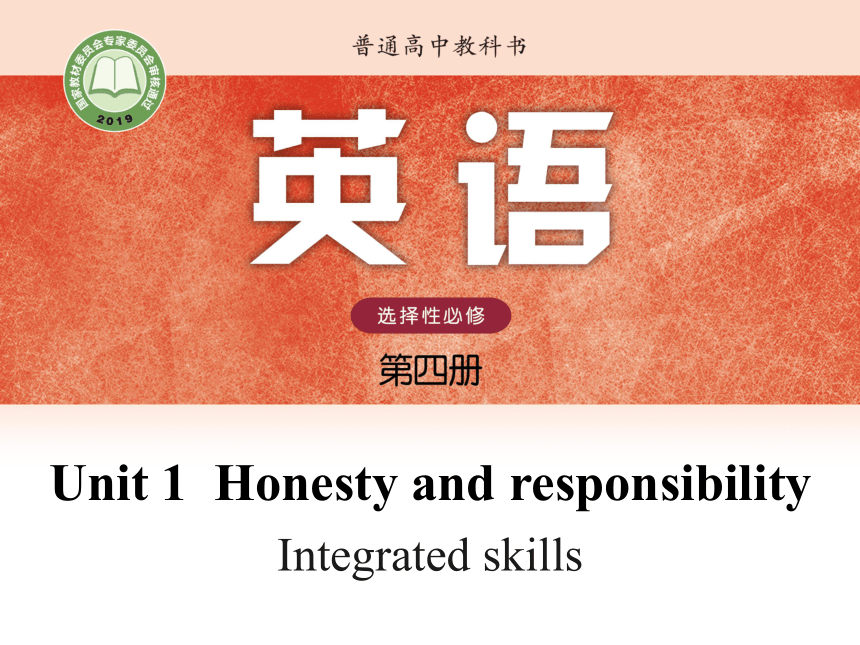 | |
| 格式 | pptx | ||
| 文件大小 | 25.1MB | ||
| 资源类型 | 教案 | ||
| 版本资源 | 外研版(2019) | ||
| 科目 | 英语 | ||
| 更新时间 | 2025-04-18 14:02:14 | ||
图片预览

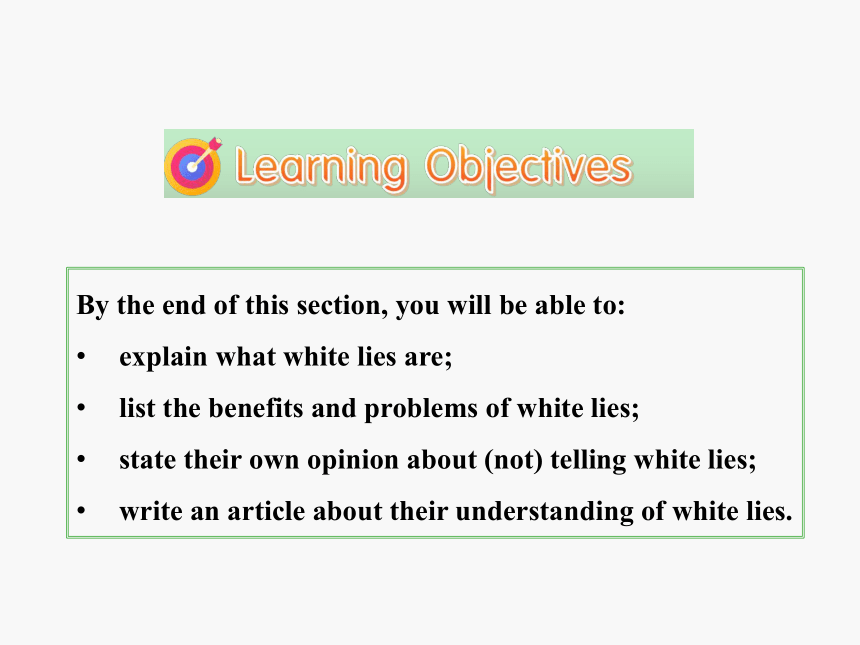
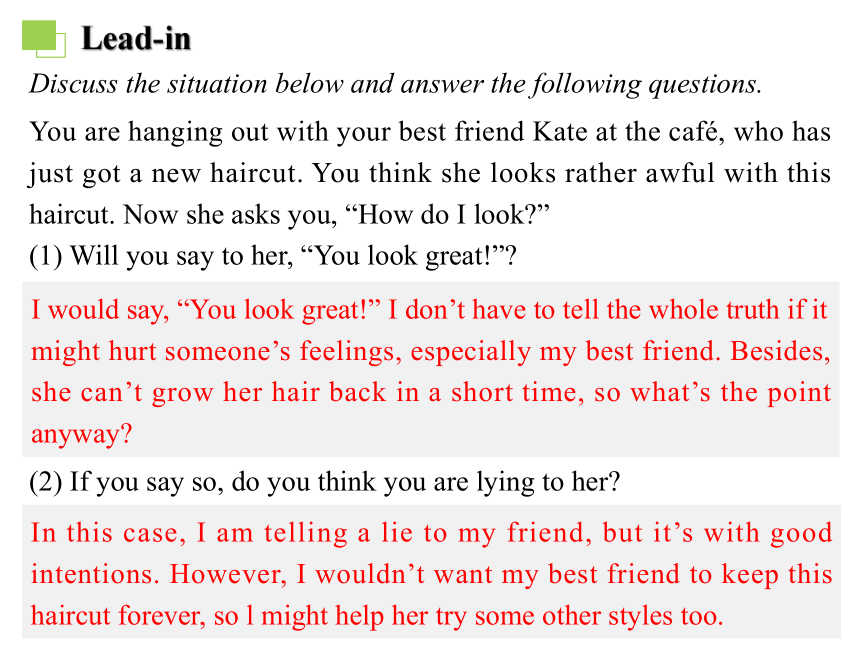
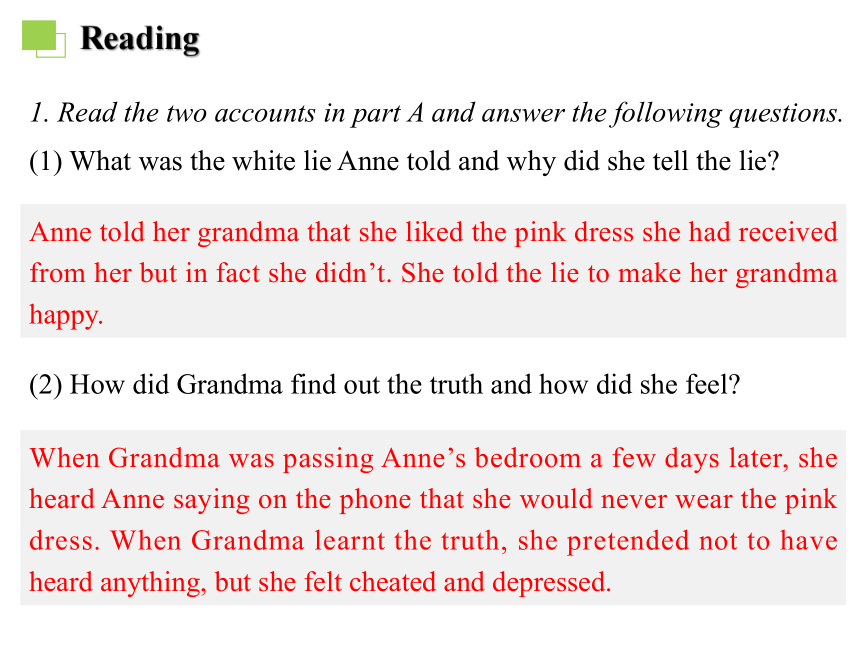

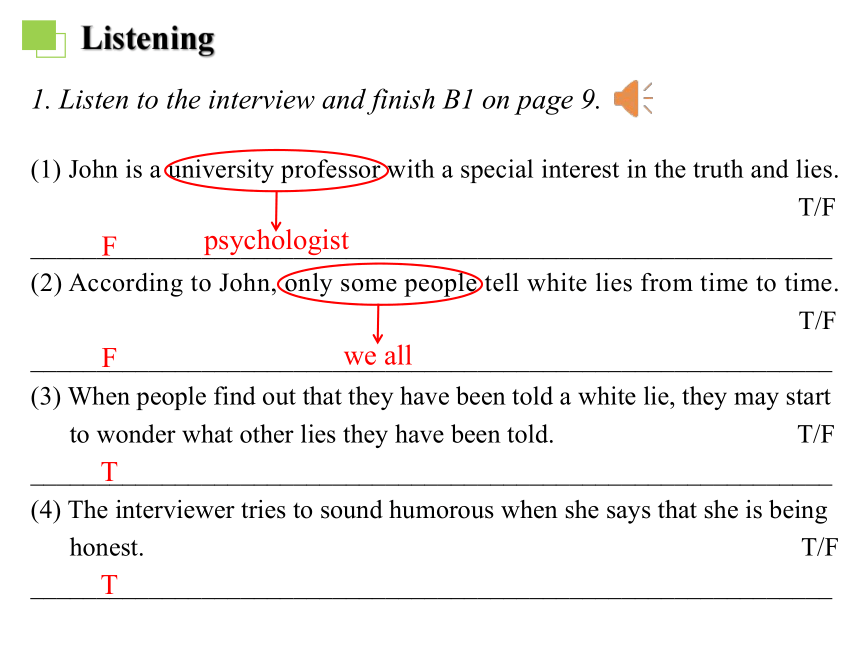
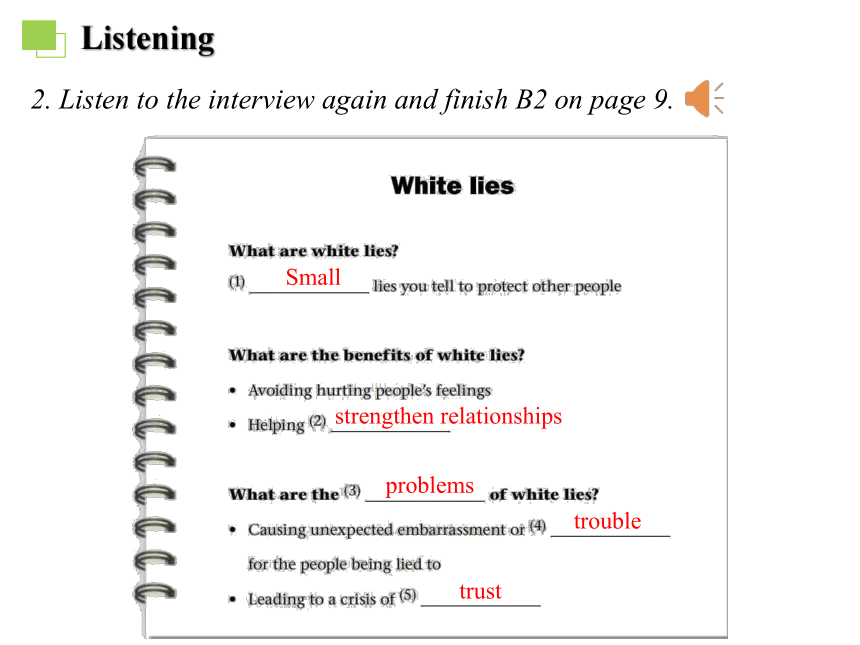
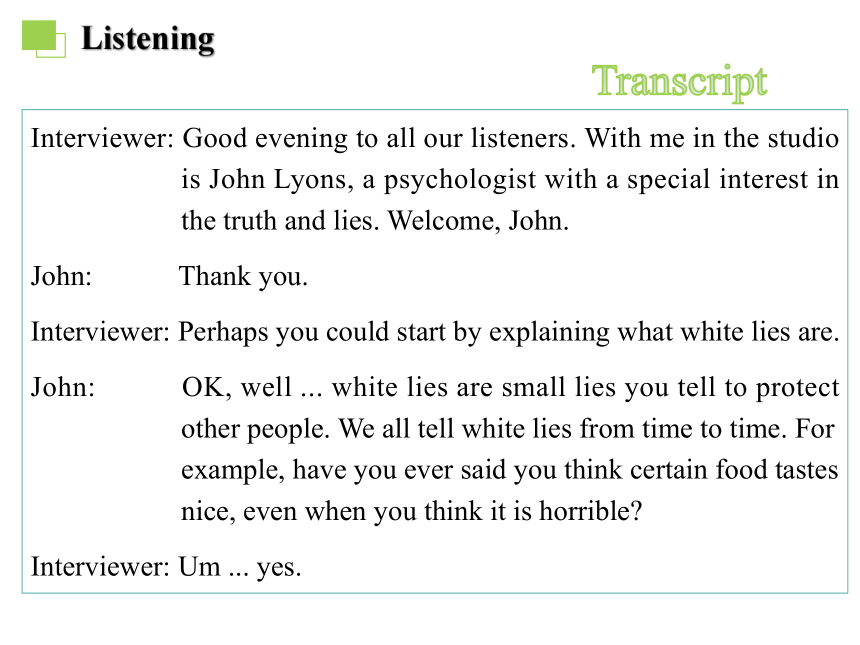
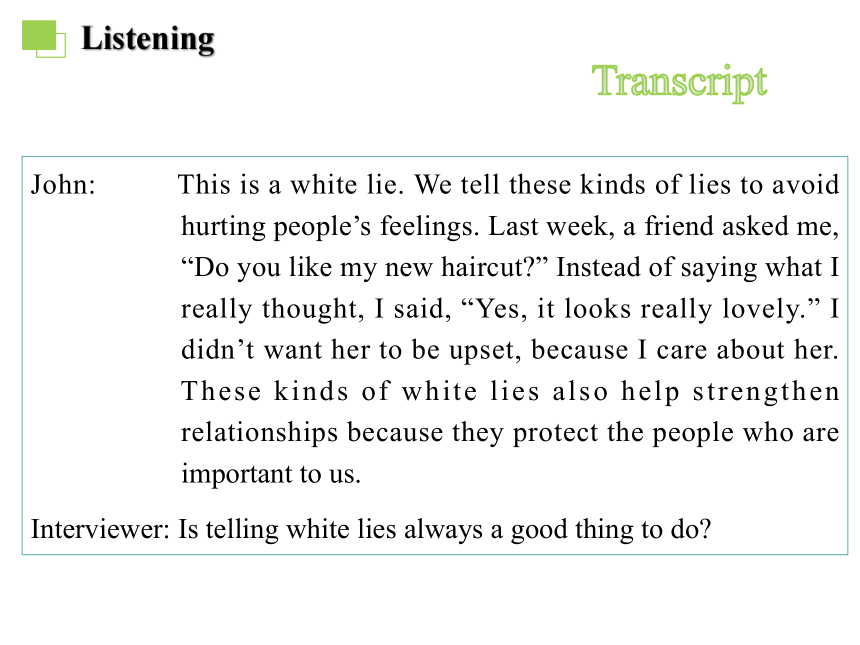
文档简介
(共22张PPT)
Unit 1 Honesty and responsibility
Integrated skills
By the end of this section, you will be able to:
explain what white lies are;
list the benefits and problems of white lies;
state their own opinion about (not) telling white lies;
write an article about their understanding of white lies.
In this case, I am telling a lie to my friend, but it’s with good intentions. However, I wouldn’t want my best friend to keep this haircut forever, so l might help her try some other styles too.
Lead-in
Discuss the situation below and answer the following questions.
You are hanging out with your best friend Kate at the café, who has just got a new haircut. You think she looks rather awful with this haircut. Now she asks you, “How do I look ”
(1) Will you say to her, “You look great!”
I would say, “You look great!” I don’t have to tell the whole truth if it might hurt someone’s feelings, especially my best friend. Besides, she can’t grow her hair back in a short time, so what’s the point anyway
(2) If you say so, do you think you are lying to her
Reading
1. Read the two accounts in part A and answer the following questions.
(1) What was the white lie Anne told and why did she tell the lie
Anne told her grandma that she liked the pink dress she had received from her but in fact she didn’t. She told the lie to make her grandma happy.
(2) How did Grandma find out the truth and how did she feel
When Grandma was passing Anne’s bedroom a few days later, she heard Anne saying on the phone that she would never wear the pink dress. When Grandma learnt the truth, she pretended not to have heard anything, but she felt cheated and depressed.
Reading
2. What can we learn from the two accounts
We need to be careful when we decide to tell such a little, “kind-hearted” lie. In Anne’s opinion, the little lie she told Grandma was not only harmless but also helped smooth an awkward situation. She thought it would make Grandma feel good. But this was not Grandma’s opinion. When she found out the truth, she felt hurt.
Listening
1. Listen to the interview and finish B1 on page 9.
(1) John is a university professor with a special interest in the truth and lies.
T/F
_____________________________________________________________
(2) According to John, only some people tell white lies from time to time.
T/F
_____________________________________________________________
(3) When people find out that they have been told a white lie, they may start
to wonder what other lies they have been told. T/F
_____________________________________________________________
(4) The interviewer tries to sound humorous when she says that she is being
honest. T/F
_____________________________________________________________
F
F
T
T
psychologist
we all
Listening
2. Listen to the interview again and finish B2 on page 9.
Small
strengthen relationships
problems
trouble
trust
Listening
Transcript
Interviewer: Good evening to all our listeners. With me in the studio
is John Lyons, a psychologist with a special interest in
the truth and lies. Welcome, John.
John: Thank you.
Interviewer: Perhaps you could start by explaining what white lies are.
John: OK, well ... white lies are small lies you tell to protect
other people. We all tell white lies from time to time. For
example, have you ever said you think certain food tastes
nice, even when you think it is horrible
Interviewer: Um ... yes.
Listening
Transcript
John: This is a white lie. We tell these kinds of lies to avoid
hurting people’s feelings. Last week, a friend asked me,
“Do you like my new haircut ” Instead of saying what I
really thought, I said, “Yes, it looks really lovely.” I
didn’t want her to be upset, because I care about her.
These kinds of white lies also help strengthen
relationships because they protect the people who are
important to us.
Interviewer: Is telling white lies always a good thing to do
Listening
Transcript
John: No. Although people tell white lies with good intentions,
white lies are not without their problems. They may
cause unexpected embarrassment or trouble for the
people being lied to. Suppose your friend is dressed too
formally for an informal party but you tell her out of
kindness that you think she looks perfect. She takes it
seriously, goes to the party and realizes that she is
dressed improperly. How embarrassed she would feel!
Interviewer: So well-meaning lies may also cause harm to people.
Listening
Transcript
John: Exactly. What’s more, as with any lie, there’s always a
risk that people being told a white lie will find out the
truth. This could lead to a crisis of trust as they may
start to wonder what other lies you have told them.
Interviewer: Thank you, John. I’m being honest when I say that was
very interesting.
1. Have you told or been told any white lies How did you feel
I have told my friend that I liked the food she made but actually I thought it was salty. I felt a bit guilty, because she could be consuming too much salt, which is not good for her health.
2. How do you feel about someone who is too honest to tell any white
lies
I think it is important to be honest. However, always telling the truth can appear impolite in certain situations. This could cause problems such as not getting along with others.
Discussing
3. In pairs, have a discussion about white lies. Use the following
questions and expressions to help you.
Discussing
Questions:
What are white lies
Do white lies always bring about good results Why or why not
Would you tell white lies or not Why
Expressions: Making concessions
Although/Though/Even though/Even if ..., ...
Despite ..., ...
Regardless of ..., ...
It is true that ..., but ...
I admit ...; however, ...
While ..., I can see that ...
Discussing
Sample
A: Generally speaking, white lies are small lies. We tell them to
protect someone because we don’t want to hurt their feelings, or
we want to be polite.
B: I may tell my best friend that she sings well when she doesn’t.
A: I admit the aim is to maintain good relations with people who are
important to us; however, white lies don’t always bring about
good results.
B: Agree. They may cause unexpected embarrassment or trouble for
the people being lied to. There’s always the possibility that people
will find out the truth.
Discussing
A: Exactly! For instance, your friend wants to participate in the school
singing competition. You know she sings badly and will need some
professional lessons if she wants to take part. Despite this, you tell
her out of kindness that she will certainly win the competition
because she’s an excellent singer. Then she loses in the first round
and feels embarrassed because she notices other students
laughing at her. She may wonder why you said she was great, and
she would be angry with you for lying to her. She may start to
wonder what other lies you’ve told her.
B: It’s true that we take a big risk when we tell white lies, but if we
don’t tell them, we might hurt those we care about. Would you tell
white lies or not
Discussing
A: While I think choosing not to tell white lies can be difficult, I can
see that the danger of ruining my relationships is higher if I’m
caught lying. For this reason, I choose not to use white lies and
rather face the consequences of always being honest.
B: And in doing so, people will always know that their trust in you is
not misplaced. Great choice!
Writing
Write an article explaining your understanding of white lies.
Planning your writing
Structure
Define white lies and illustrate the definition with examples.
Explain why people tell white lies.
Raise doubts about the idea that white lies always bring about good results, and give reasons.
State whether you will tell white lies and explain why.
Writing
Writing techniques
You should use diverse language in your writing.
You can try to vary the vocabulary you choose. For example, when you mean lying, you can use tell a lie, make up a story, withhold the truth, etc.
You can use different sentence structures. She told a lie to him and The truth was withheld from him by her convey nearly the same meaning but use different structures with varying degrees of formality.
Writing
Sample
White Lies
White lies are small lies that we tell to protect someone because we do not want to hurt their feelings, or we want to be polite. For example, you may tell your best friend that she sings well when she does not, or you tell your mum that the food she cooks is excellent instead of what you really think. These kinds of white lies help maintain good relations with people who are important to us.
However, white lies do not always bring about good results. They may cause unexpected embarrassment or trouble for the people being lied to. What’s more, there is always a risk that people being told a white lie will find out the truth. If a white lie is discovered, it can cause a crisis of trust and possibly damage the relationship. For instance, your friend wants to participate in the school singing competition. You know she sings badly and will need some professional
Writing
lessons if she wants to take part. Despite this, you tell her out of kindness that she will certainly win the competition because she is a great singer. When she loses in the first round and notices other students laughing at her, she feels embarrassed and realizes you lied to her. She is certain to become angry with you and start to wonder what other lies she has been told.
Choosing not to tell white lies can be difficult because it means you risk hurting those you care about. However, the risk of ruining relationships is higher if you are caught in a lie. For this reason, I choose not to tell white lies and I would rather face the consequences of always being honest so that people will know their trust in me is not misplaced.
Writing
Remember to check your writing after you finish and exchange drafts between you and your partner. Pay attention to the following aspects:
□ Punctuation □ Spelling □ Grammar
□ Choice of words □ Style (formal/informal) □ Structure
Self-review
How do you define white lies Can you give any examples
How well can you use diverse language in your writing
Peer review
What does your partner think of your understanding of white lies
What suggestions does your partner give to improve your writing
Checking your writing
Polish up your article.
Unit 1 Honesty and responsibility
Integrated skills
By the end of this section, you will be able to:
explain what white lies are;
list the benefits and problems of white lies;
state their own opinion about (not) telling white lies;
write an article about their understanding of white lies.
In this case, I am telling a lie to my friend, but it’s with good intentions. However, I wouldn’t want my best friend to keep this haircut forever, so l might help her try some other styles too.
Lead-in
Discuss the situation below and answer the following questions.
You are hanging out with your best friend Kate at the café, who has just got a new haircut. You think she looks rather awful with this haircut. Now she asks you, “How do I look ”
(1) Will you say to her, “You look great!”
I would say, “You look great!” I don’t have to tell the whole truth if it might hurt someone’s feelings, especially my best friend. Besides, she can’t grow her hair back in a short time, so what’s the point anyway
(2) If you say so, do you think you are lying to her
Reading
1. Read the two accounts in part A and answer the following questions.
(1) What was the white lie Anne told and why did she tell the lie
Anne told her grandma that she liked the pink dress she had received from her but in fact she didn’t. She told the lie to make her grandma happy.
(2) How did Grandma find out the truth and how did she feel
When Grandma was passing Anne’s bedroom a few days later, she heard Anne saying on the phone that she would never wear the pink dress. When Grandma learnt the truth, she pretended not to have heard anything, but she felt cheated and depressed.
Reading
2. What can we learn from the two accounts
We need to be careful when we decide to tell such a little, “kind-hearted” lie. In Anne’s opinion, the little lie she told Grandma was not only harmless but also helped smooth an awkward situation. She thought it would make Grandma feel good. But this was not Grandma’s opinion. When she found out the truth, she felt hurt.
Listening
1. Listen to the interview and finish B1 on page 9.
(1) John is a university professor with a special interest in the truth and lies.
T/F
_____________________________________________________________
(2) According to John, only some people tell white lies from time to time.
T/F
_____________________________________________________________
(3) When people find out that they have been told a white lie, they may start
to wonder what other lies they have been told. T/F
_____________________________________________________________
(4) The interviewer tries to sound humorous when she says that she is being
honest. T/F
_____________________________________________________________
F
F
T
T
psychologist
we all
Listening
2. Listen to the interview again and finish B2 on page 9.
Small
strengthen relationships
problems
trouble
trust
Listening
Transcript
Interviewer: Good evening to all our listeners. With me in the studio
is John Lyons, a psychologist with a special interest in
the truth and lies. Welcome, John.
John: Thank you.
Interviewer: Perhaps you could start by explaining what white lies are.
John: OK, well ... white lies are small lies you tell to protect
other people. We all tell white lies from time to time. For
example, have you ever said you think certain food tastes
nice, even when you think it is horrible
Interviewer: Um ... yes.
Listening
Transcript
John: This is a white lie. We tell these kinds of lies to avoid
hurting people’s feelings. Last week, a friend asked me,
“Do you like my new haircut ” Instead of saying what I
really thought, I said, “Yes, it looks really lovely.” I
didn’t want her to be upset, because I care about her.
These kinds of white lies also help strengthen
relationships because they protect the people who are
important to us.
Interviewer: Is telling white lies always a good thing to do
Listening
Transcript
John: No. Although people tell white lies with good intentions,
white lies are not without their problems. They may
cause unexpected embarrassment or trouble for the
people being lied to. Suppose your friend is dressed too
formally for an informal party but you tell her out of
kindness that you think she looks perfect. She takes it
seriously, goes to the party and realizes that she is
dressed improperly. How embarrassed she would feel!
Interviewer: So well-meaning lies may also cause harm to people.
Listening
Transcript
John: Exactly. What’s more, as with any lie, there’s always a
risk that people being told a white lie will find out the
truth. This could lead to a crisis of trust as they may
start to wonder what other lies you have told them.
Interviewer: Thank you, John. I’m being honest when I say that was
very interesting.
1. Have you told or been told any white lies How did you feel
I have told my friend that I liked the food she made but actually I thought it was salty. I felt a bit guilty, because she could be consuming too much salt, which is not good for her health.
2. How do you feel about someone who is too honest to tell any white
lies
I think it is important to be honest. However, always telling the truth can appear impolite in certain situations. This could cause problems such as not getting along with others.
Discussing
3. In pairs, have a discussion about white lies. Use the following
questions and expressions to help you.
Discussing
Questions:
What are white lies
Do white lies always bring about good results Why or why not
Would you tell white lies or not Why
Expressions: Making concessions
Although/Though/Even though/Even if ..., ...
Despite ..., ...
Regardless of ..., ...
It is true that ..., but ...
I admit ...; however, ...
While ..., I can see that ...
Discussing
Sample
A: Generally speaking, white lies are small lies. We tell them to
protect someone because we don’t want to hurt their feelings, or
we want to be polite.
B: I may tell my best friend that she sings well when she doesn’t.
A: I admit the aim is to maintain good relations with people who are
important to us; however, white lies don’t always bring about
good results.
B: Agree. They may cause unexpected embarrassment or trouble for
the people being lied to. There’s always the possibility that people
will find out the truth.
Discussing
A: Exactly! For instance, your friend wants to participate in the school
singing competition. You know she sings badly and will need some
professional lessons if she wants to take part. Despite this, you tell
her out of kindness that she will certainly win the competition
because she’s an excellent singer. Then she loses in the first round
and feels embarrassed because she notices other students
laughing at her. She may wonder why you said she was great, and
she would be angry with you for lying to her. She may start to
wonder what other lies you’ve told her.
B: It’s true that we take a big risk when we tell white lies, but if we
don’t tell them, we might hurt those we care about. Would you tell
white lies or not
Discussing
A: While I think choosing not to tell white lies can be difficult, I can
see that the danger of ruining my relationships is higher if I’m
caught lying. For this reason, I choose not to use white lies and
rather face the consequences of always being honest.
B: And in doing so, people will always know that their trust in you is
not misplaced. Great choice!
Writing
Write an article explaining your understanding of white lies.
Planning your writing
Structure
Define white lies and illustrate the definition with examples.
Explain why people tell white lies.
Raise doubts about the idea that white lies always bring about good results, and give reasons.
State whether you will tell white lies and explain why.
Writing
Writing techniques
You should use diverse language in your writing.
You can try to vary the vocabulary you choose. For example, when you mean lying, you can use tell a lie, make up a story, withhold the truth, etc.
You can use different sentence structures. She told a lie to him and The truth was withheld from him by her convey nearly the same meaning but use different structures with varying degrees of formality.
Writing
Sample
White Lies
White lies are small lies that we tell to protect someone because we do not want to hurt their feelings, or we want to be polite. For example, you may tell your best friend that she sings well when she does not, or you tell your mum that the food she cooks is excellent instead of what you really think. These kinds of white lies help maintain good relations with people who are important to us.
However, white lies do not always bring about good results. They may cause unexpected embarrassment or trouble for the people being lied to. What’s more, there is always a risk that people being told a white lie will find out the truth. If a white lie is discovered, it can cause a crisis of trust and possibly damage the relationship. For instance, your friend wants to participate in the school singing competition. You know she sings badly and will need some professional
Writing
lessons if she wants to take part. Despite this, you tell her out of kindness that she will certainly win the competition because she is a great singer. When she loses in the first round and notices other students laughing at her, she feels embarrassed and realizes you lied to her. She is certain to become angry with you and start to wonder what other lies she has been told.
Choosing not to tell white lies can be difficult because it means you risk hurting those you care about. However, the risk of ruining relationships is higher if you are caught in a lie. For this reason, I choose not to tell white lies and I would rather face the consequences of always being honest so that people will know their trust in me is not misplaced.
Writing
Remember to check your writing after you finish and exchange drafts between you and your partner. Pay attention to the following aspects:
□ Punctuation □ Spelling □ Grammar
□ Choice of words □ Style (formal/informal) □ Structure
Self-review
How do you define white lies Can you give any examples
How well can you use diverse language in your writing
Peer review
What does your partner think of your understanding of white lies
What suggestions does your partner give to improve your writing
Checking your writing
Polish up your article.
